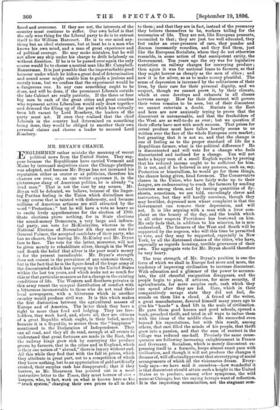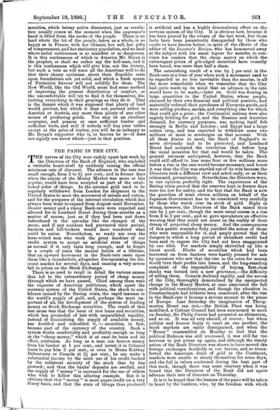MR. BRYAN'S CHANCE.
WNGLISHMEN rather mistake the meaning of recent political news from the United States. They sup- pose because the Republicans have carried Vermont and Xaine by increased majorities since the Chicago platform was adopted, and because Mr. Bryan has not increased his reputation either as orator or as politician, therefore his chances are over, or, as one writer expresses it, in the picturesque slang of American politics, he is already "a dead man." That is not the case by any means. Mr. Bryan will be defeated, we believe, because of the linger- ing Puritan feeling in the Union which disinclines men to any course that is tainted with dishonesty, and because millions of American artisans are still attracted by the word " Protection ; " but he will have a vote so heavy as to excite lively apprehensions for the election of 1900. State elections prove nothing, for in State elections the sound-money Democrats, a very large and -influen- tial party, can vote for McKinleyites, whereas in the National Election of November 4th they must vote for General Palmer, the accepted candidate of their party, who has no chance, thus leaving Mr. McKinley and Mr. Bryan face to face. The vote for the latter, moreover, will not be given merely to rehabilitate silver, in the West and South the belief that silver is the poor man's money is for the present ineradicable. Mr. Bryan's strength does not consist in the prevalence of any economic theory, but in the fact that he is the figure-head of the huge army of the discontented which has sprung up in the United States within the last ten years, and which seeks not so much for this or that particular measure as for a change in the existing conditions of life. The Western and Southern privates in this army resent the unequal distribution of comfort with a bitterness inconceivable to those who do not read their local newspapers, with a bitterness which in another • country would produce civil war. It is this which makes the first distinction between the agricultural masses of Europe and of America. The latter think they have a right to more than food and lodging. They are free- holders, they work hard, and, above all, they are citizens -of a great Republic which ought, in their belief, merely because it is a Republic, to secure them the " happiness " mentioned in the Declaration of Independence. They can all read, and they all do read, enough at all events to understand that great fortunes are made in the East, that the railway kings grow rich by conveying the produce grown by farmers, that in the cities and in England, which is their one notion of " abroad," there is luxury without end. All this while they find that with the fall in prices, which they attribute in great part, not to a competition of which they know nothing, but to an appreciation of gold artificially -created, their surplus cash has disappeared ; that if they borrow, as Mr. Shearman has pointed out in a most instructive letter to the Times, they must borrow of stor. keepers, who, in fact, work on what is known here as the -" truck system," charging their own prices to all in debt to them ; and that they are in fact, instead of the yeomanry they believe themselves to be, workers toiling for the necessaries of life. They are not, like European peasants, reconciled to that; they are just too well educated, they fret under an over-pressure of care, they ponder and discuss incessantly remedies, and they find them, just like the European Socialists, whom they do not otherwise resemble, in some action of that omnipotent entity, the Government. Ten years ago the cry was for legislative restriction on railway charges for conveying produce ; then again it was for national loans to farmers, so that they might borrow as cheaply as the men of cities ; and now it is for silver, so as to make money plentiful. The sense of depression is increased by the solitariness of their lives, by their care for their personal dignity, and we suspect, though we cannot prove it, by their climate, which at once develops and exhausts in all classes nervous energy. How far their discontent will govern their votes remains to be seen, but of their discontent we cannot entertain a doubt. Statists in the East and here are now anxiously trying to prove that the discontent is unreasonable, and that the freeholders of the West are as well-to-do as ever ; but we question if their efforts have met with much success. That prices for cereal produce must have fallen heavily seems to us written over the face of the whole European corn market ; but granting that it is not so, and that the change is one of feeling as to the proper standard of life for a Republican farmer, what is the political difference ? He is discontented and will vote for a change who feels discontented and inclined for a change. You will not make a happy man of a small English 'squire by proving that his reduced income ought to be sufficient for him. It is not, and if he believed in any panacea, such as, say, Protection or bimetallism, he would go for those things, the chance being given, lima foremost. The Conservative classes in the Union, who have fairly woke up to their danger, are endeavouring to reach the farmers by sending lecturers among them, and by issuing quantities of fly- sheets, sometimes, we are told, exceedingly clever and instructive, but they will hardly convince, though they may bewilder, depressed men whose complaint is that the Government can remove their depression, and will not. It is like arguing with a man with a liver com- plaint on the beauty of the day, and the health which in all other respects Providence has bestowed on him. He only feels that, in addition to his miseries, he is mis- understood. The farmers of the West and South will be supported by the negroes, who will this time be permitted to vote, and they may be supported, especially in New York, by all the distressed classes of the cities, who have, especially as regards housing, terrible grievances of their own. The aggregate vote for Mr. Bryan should therefore be very heavy.
The true strength of Mr. Bryan's position is one the force of which we shall in Europe feel more and more, the tendency of improving civilisation to increase discontent. With education and a glimmer of the power to accumu- late, the old cheerful resignation disappears, and the people begin to pine, if artisans, for more security, if agriculturists, for more surplus cash, cash which they can spend after they are fed. Care, which in their comparatively savage state they did not feel, de- scends on them like a cloud. A friend of the writer, a great manufacturer, devoted himself many years ago to give his "hands" a dead lift in the scale of civilisation. He gave them good houses and good schools, opened a. bank, preached thrift, and tried in all ways to imbue them with the ideas of the middle class. He succeeded even beyond his expectations, but with this result, among others, that care filled the minds of his people, that thrift grew into a passion, and that the sum of content in the village was reduced one-half. Precisely the same conse- quences are following increasing enlightenment in France and Germany. Socialism, which is merely discontent ex- pressing itself in a formula, keeps almost exact pace with civilisation, and though it will not produce the changes it dreams of, will effectually prevent that stereotyping of social arrangements of which all the visionaries dream. Every- body says—we have said it ourselves—how wonderful it is that discontent should attain such a height in the United States as to produce, among other symptoms, the wild scene at Chicago; but the saying betrays want of reflection. It is the improving communities, not the stagnant own- munities, which betray active discontent, just as revolu- tion usually comes at the moment when the oppressor's hand is lifted from the necks of the people. There is no land where the lot of the people, taken as a whole, is so happy as in France, with her climate, her soil, her gifts of temperament, and her stationary population, and no land where social restlessness is so manifest or so dangerous. It is this restlessness of which in America Mr. Bryan is the prophet, or shall we rather say the bell-man, and it is this restlessness which will give him, not the victory, but such a vote as will warn all the American well-to-do that their cheery optimism about their Republic rests upon foundations not yet solid, and which a fresh spasm of Protective fervour will not solidify for them. The New World, like the Old World, must find some method of improving the present distribution of comfort, or the uncomfortable will try to find it for themselves, dis- turbing everything in their gropings as they do it. That is the danger which it was supposed that plenty of land would prevent, but which it does not prevent either in America or Austria, any more than plenty of any other means of producing goods. You may be an excellent carpenter, and possess at once sufficient timber and sufficient tools, and still if nobody will buy your tables except at the price of timber, you will be as unhappy as Mr. Bryan's supporter who is, or fancies he is—it does not signify one straw which—just in that position.



































 Previous page
Previous page